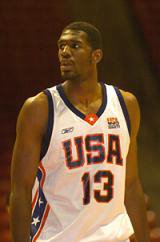 Travis Sawchik of the Myrtle Beach Sun News has an extensive piece on the effects of the new 1-year out-of-high-school age limit on premiere high school basketball players. (Sawchik, "The Waiting Game," Myrtle Beach Sun News, 12/29/2005). If eligible for the 2006 NBA Draft, it is widely-presumed that Greg Oden (pictured to left) would be the first pick, and Thaddeus Young would likely be a top 10 pick as well. Absent a legal challenge, of course, these players will not be eligible, as the NBA and NBPA collectively-bargained away that possibility (and neither these players nor their families had a seat at the bargaining table).
Travis Sawchik of the Myrtle Beach Sun News has an extensive piece on the effects of the new 1-year out-of-high-school age limit on premiere high school basketball players. (Sawchik, "The Waiting Game," Myrtle Beach Sun News, 12/29/2005). If eligible for the 2006 NBA Draft, it is widely-presumed that Greg Oden (pictured to left) would be the first pick, and Thaddeus Young would likely be a top 10 pick as well. Absent a legal challenge, of course, these players will not be eligible, as the NBA and NBPA collectively-bargained away that possibility (and neither these players nor their families had a seat at the bargaining table).
I was interviewed for this story regarding a potential legal challenge. Though the new provision was collectively-bargained, that does not accord it absolute immunity from legal scrutiny (especially if a prospective challenge is heard in a different federal appellate court of appeals than the U.S. Court of Appeals for the Second Circuit, which heard Clarett v. NFL). Also, a prospective lawsuit by a high school player or group of high school players should be considered materially different from Maurice Clarett's lawsuit, since we've already seen high school players jump to the NBA, and they average more points, rebounds, and assists than the average NBA player or the average player of any age group. I also express a philosophical opposition to legally treating monopsonistic leagues and exceedingly-wealthy players the same as competitive companies and working class union members. We're not even comparing apples and oranges; it's more like caviar and fruits.
So should the law treat Ford Motor Company, one of many automakers, the same as the NBA, which has no rival? And should millionaire NBA players, whose average career lasts just four years, be treated the same as Ford assembly-line workers, who might work for 45 years and never earn what some NBA players earn in one year?"Clarett had to argue a hypothetical," McCann said. "Basketball players wouldn't have that issue; basketball has had 10 years of data. Basketball players can say we're not arguing a hypothetical. We have gone to the NBA and have had success."
According to a research paper written by McCann and published in the Virginia Sports and Entertainment Journal, an NBA player who jumps from high school can make up to $100 million more during his career than if he earned a college degree first.
McCann also questions the legitimacy of pro sports unions bargaining away future players rights.
"There is incentive for existing players to watch out for their own interests," McCann said. "It's one thing if you have a union of factory workers ... but sports leagues are monopolies [monopsonies, more precisely], you can't play anywhere else for similar compensation."





0 comments:
Post a Comment